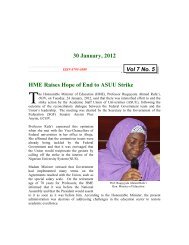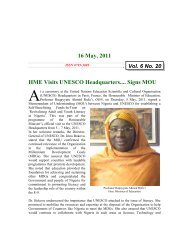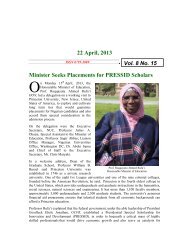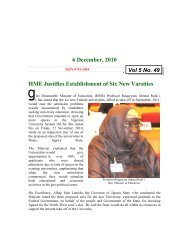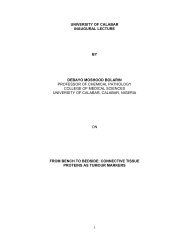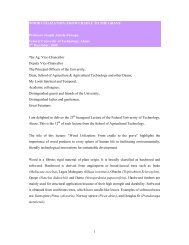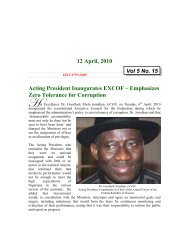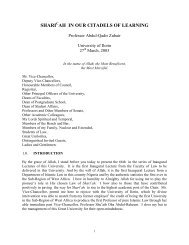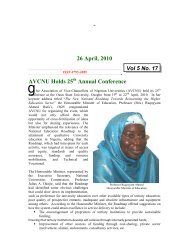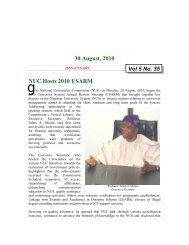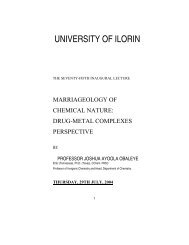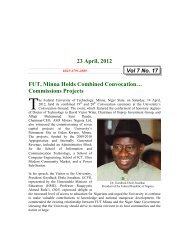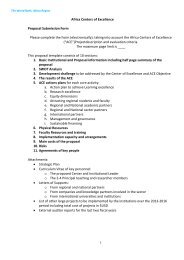From State And State Power To Man And Social - National ...
From State And State Power To Man And Social - National ...
From State And State Power To Man And Social - National ...
You also want an ePaper? Increase the reach of your titles
YUMPU automatically turns print PDFs into web optimized ePapers that Google loves.
conflicts. Even when other motives or interests are presented as issues in dispute, often, but notalways, the hidden and real motivating factors are economic, in particular, contention over thecontrol of some valuable natural resources. In the case under reference, it was the discovery ofcrude oil in the disputed territory in 1967 that heightened the interests of the governments ofNigeria and Cameroon in the disputed territories, especially, the Bakassi peninsula. Thelivelihood opportunities of the people in the area, their fishing rights and their general welfarewere obviously of little or no interest to successive governments in Nigeria and Cameroon. Eventhe question of whether the people in the area wished to be Nigerians or Cameroonians did notbother the governments of the two countries much. This explains why the Nigerian Governmentreadily accepted the results of the plebiscite in southern Cameroon in 1961, but, initially, rejectedthe verdict of the ICJ in 2002, even when Nigeria secured from that ruling a substantial portionof territory, and gained some people in the process. In the mind of the rulers in Nigeria, the lossof the Bakassi peninsula overshadowed all the gains in territory and people because it is an oilbearingor resource-rich territory.Third, pressure from the real victims of international conflicts, that is, those whose livelihoodchances are immediately and directly threatened by the conflicts is often not critical in bringingabout a resolution to the conflicts. Rather it is the influence and interests of those who are likelyto benefit materially, in the long run, from a prolongation of the conflict that weigh more withnational decision-makers. Examples of the latter social group in the dispute between Nigeria andCameroon were the oil-prospecting companies, operating on both sides of the divide, as well aspotential suppliers of arms and ammunition, local and international. It is, therefore, obvious thatconflicts that involve high stakes, represented by the presence of valuable natural resource, tendto endure. It is, therefore, important to scrutinize closely the real interests of actors that urge theparties in dispute not to accept some particular terms of settlement arrived at by judicial or nonjudicialprocesses, and to press on, through the use of force, to obtain more advantageousoutcome.Fourth, enduring conflict resolution must be based on clear, generally accepted principles, whichserve, promote and improve human welfare, not those which merely satisfy the interests ofabstract entities, such as states. In this respect, the superiority of human right norms over theprinciples associated with raison d’etat needs to be stressed. By the same token, democraticconsultation with direct, actual or potential victims of violent conflicts, that is the majority of thecitizens of a state, or the current inhabitants of a disputed territory, is more efficacious inpeaceful resolution of such conflicts, than reliance on the views of the indirect beneficiaries ofthe continuation of the conflicts or the conflict situations.Economic Diplomacy and <strong>National</strong> Interest (1991)In a work published 1991, but whose production spanned several years, I pursued further my reconceptualizationof international relations, and refocusing of the study of foreign policy in astudy entitled: “Nigeria: Economic Diplomacy and <strong>National</strong> Interest-An Analysis of the Politicsof Nigeria’s External Economic Relations”. The article was published in a special edition of theNigerian Journal of International Affairs by the Nigerian Institute of International Affairs,and reprinted in 2005 as part of a book, also published by the NIIA. [Nigerian Journal ofInternational Affairs, Vol. 17, No.2, 1991; 34-98].19



